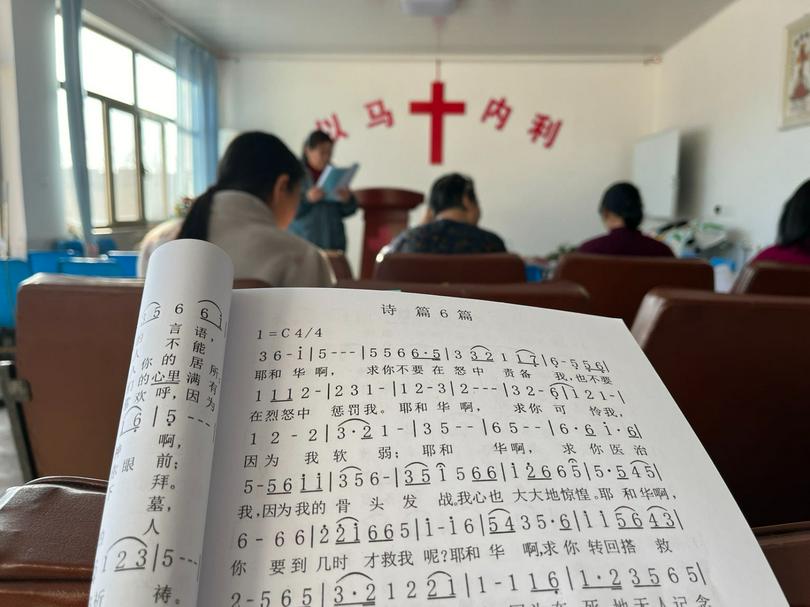The sound of praise with local features was clearer in the air as I got closer to the church’s courtyard through the open gate. A Christian woman next to me handed me the sheet music in her hand as I stepped into the chapel and sat down, and she continued to read it on her phone.
I was at my hometown church's Saturday afternoon praise and prayer meeting. It was the Spring Festival, and everyone was singing hymns about saying goodbye to the past year and welcoming the new year, as well as gratitude and blessings. Each song was sung twice, with some unfamiliar hymns sung several times more while listening to the music.
After two hours of praise, the congregation began to pray for their own spiritual lives, for confessing their weaknesses before God, and for spreading the gospel. At five p.m., when the sun set and the temperature dropped, the church staff turned up the heat to prepare for the following Sunday's service.
This is a rural church founded around 2010 that had previously relocated to various spots, including a few years in the home of a warm-hearted believer and several years renting an unused villager's house. After the village grew, a sports square, basketball courts, supermarkets, and other amenities were constructed. The church also received land approval from the local authorities and started construction.
My last visit was before COVID-19, and many familiar faces from my childhood were not present. I remember there was a period when folks congregated at the elder's house. The house was full of people as everyone was seated on the kang (a traditional heated platform used for daily living and sleeping in northern China's severe winters), with others sitting on stools. Most of the congregants are young and middle-aged Christian women and a few Christian men, many of whom have left the church, some working elsewhere and others leaving to care for their grandchildren. For the first time, I could feel the impact of the migrant labor wave on the church, as there were very few young people left.
In recent years, with the implementation of replacing coal with electricity in rural areas, every family, including the church, has used electricity for heating. Due to elderly believers' cold intolerance, the church bought an air conditioner as supplementary heating. Not long ago, a larger rural church nearby replaced its seats, and the old ones were sent here. Everyone felt more comfortable than they had on the prior iron chairs.
Compared to hardware, church software is advancing. My mother is one of three co-workers at the church, and she has to take turns preaching on Sundays. She believes she does not have the talent for preaching. The positive side is that a church in the county three kilometers away provides them with plenty of spiritual resources and a sermon collection. So she led everyone in reading the sermons together. They also have the Westminster Catechisms, Psalms, several hymns of praise materials, and creed pamphlets. In addition to Sunday services, prayer and praise meetings are held every Saturday and Sunday afternoon, as well as Bible studies on Thursdays.
The gatherings did not always flow as planned. The worship and praise leader finally arrived and quickly taught a few songs. Only half of the Bible reading plan was completed in the morning, with the remainder done in the afternoon. However, congregations place a high priority on certain basic principles. For example, a believer's relative came to the church and wanted to share. After a discussion, the church staff decided that the pulpit should not be handed over easily. The sharer's church and religious situation should be assessed first.
In rural areas, there are very few Christian men, so a large number of Christian women have husbands who do not believe in the Lord. The bright side is that they have no objections to the wives attending church, even if the husbands themselves do not follow Jesus. On the contrary, some disagree with their wives' attendance at church, which leads to some spouses progressively leaving the church. The church elder mentioned that his son, who lives in the city, married a non-believer who opposed him attending gatherings. He encouraged single Christians to marry someone in the Lord.
On this visit, I noticed that several aunts who followed the Lord with my mother are still active members of the church despite their advanced ages. It is encouraging that, in recent years, middle-aged people have joined. My mother said that they are believers in the nearby rural areas, where people from other places have moved in recent years as development has progressed.
I believe that, as a result of urbanization and other societal changes, rural churches are sometimes lush and verdant, but also struggling. However, as long as the Holy Spirit blows like a spring breeze, new life will emerge.
- Translated by Poppy Chan












